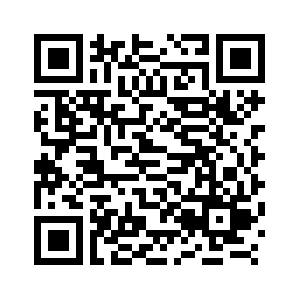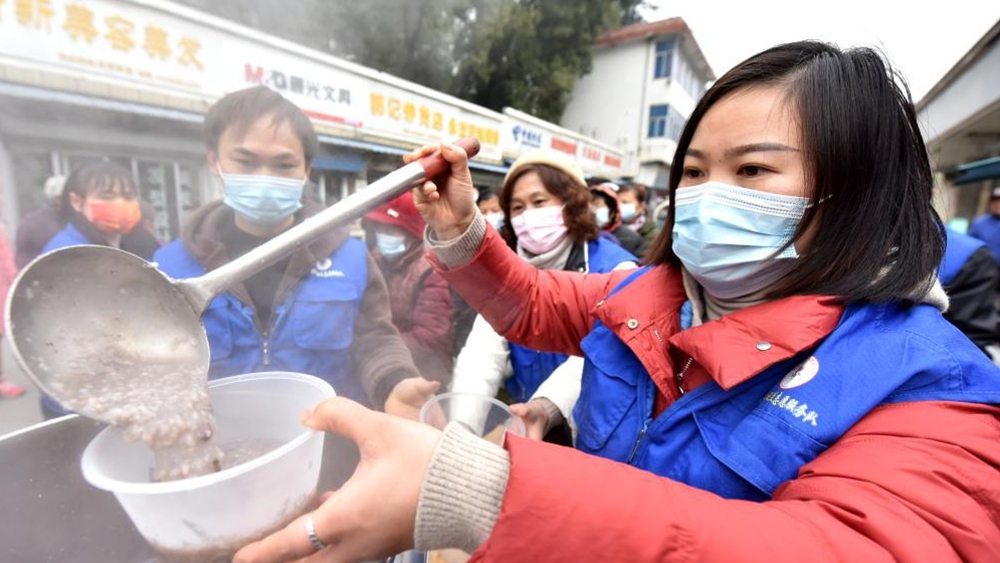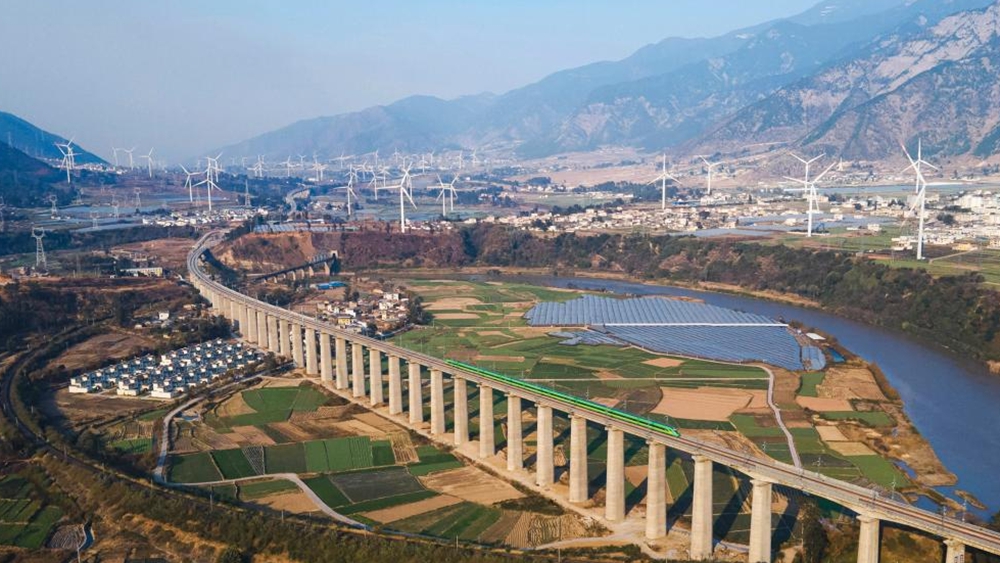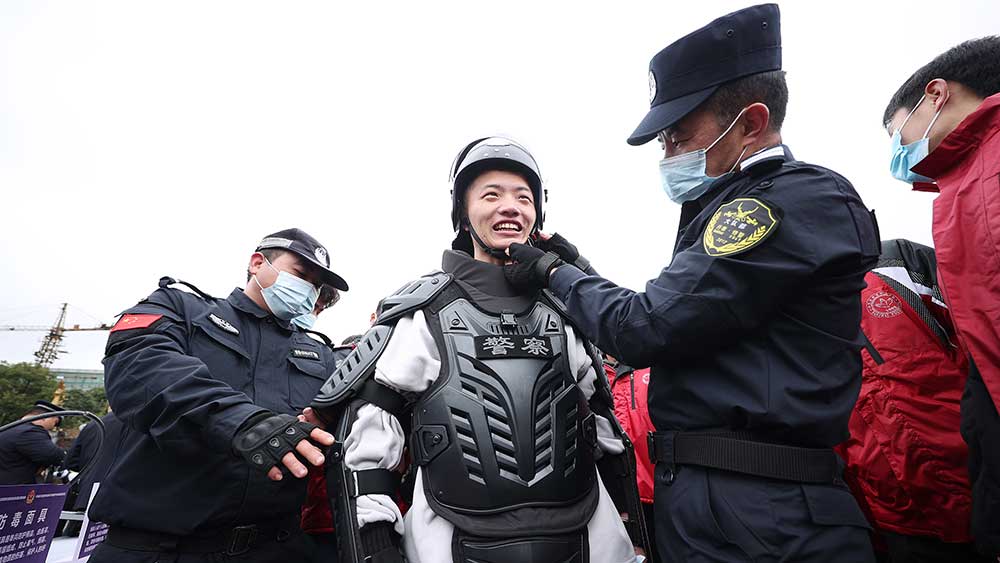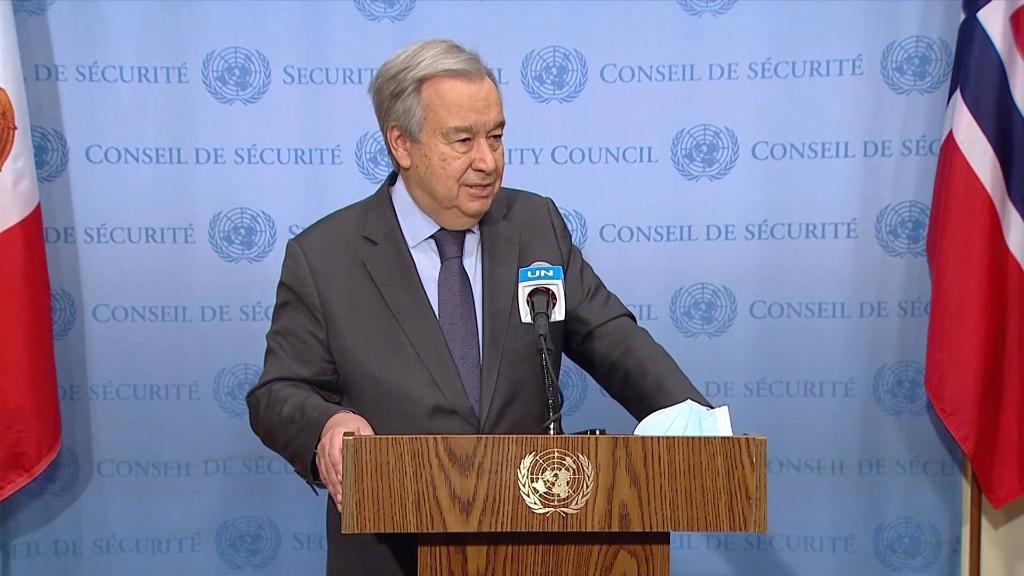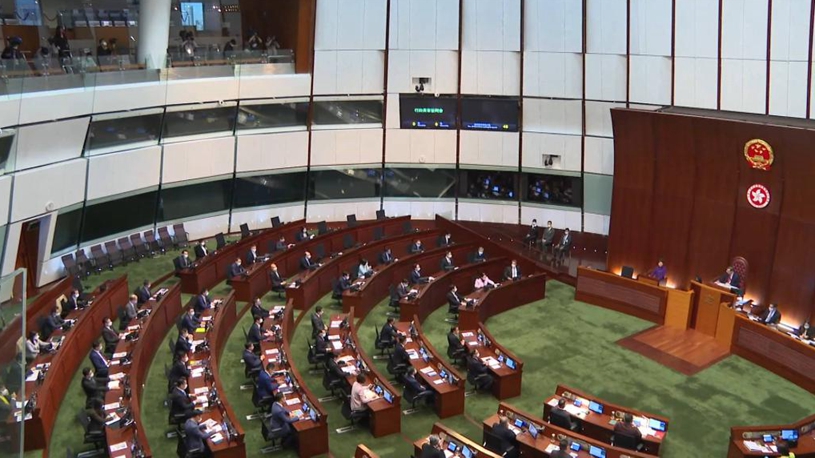-- Time and again U.S. politicians have played the U.S. tradition of "passing the buck," scapegoating others for their own fault and shifting responsibilities onto others.
-- Behind this signature buck-passing tradition is Washington elites' dirty tricks and self-serving calculations to salvage the decaying U.S. hegemony by containing others, which has proved to be a growing threat to world peace and international cooperation.
-- As the world's sole superpower, the United States has shirked its due responsibility to take a leading role in tackling global challenges.
BEIJING, Jan. 14 (Xinhua) -- Time and again U.S. politicians have played the U.S. tradition of "passing the buck," scapegoating others for their own fault and shifting responsibilities onto others.
The year 2021 has witnessed this shameful story being told anew. When the United States messed up its domestic COVID-19 fight, they smeared China and hyped up the groundless lab leak theory; when Afghanistan was plunged into crisis after the U.S. botched withdrawal, they blamed Afghans for the chaos; when the Democrats and Republicans failed to reach consensus on climate issues, they pointed fingers at environmental policy of other countries.
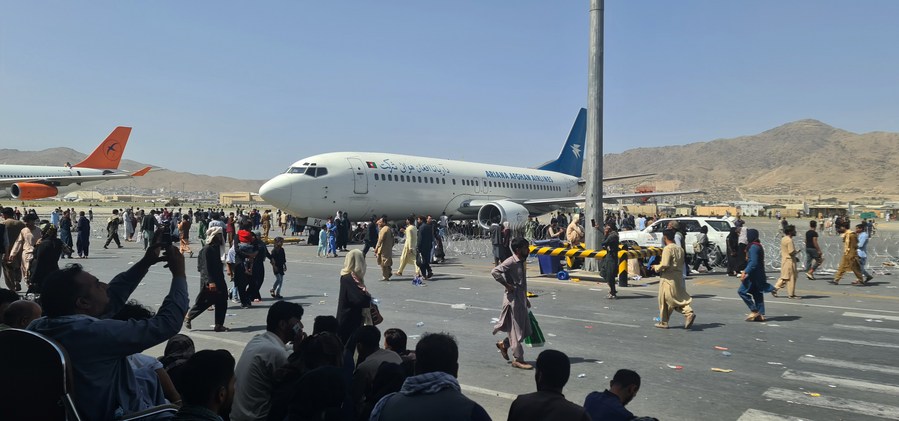
People gather at the Kabul airport during evacuation in Kabul, Afghanistan, Aug. 16, 2021. (Xinhua)
Behind this signature buck-passing tradition is Washington elites' dirty tricks and self-serving calculations to salvage the decaying U.S. hegemony by containing others, which has proved to be a growing threat to world peace and international cooperation.
EXPORTING TURMOILS
From Afghanistan to Iraq, from the so-called "color revolution" to the Arab Spring, the United States launched wars and provoked confrontation all over the world, becoming the biggest saboteur of global peace and stability.
The initiator of the turmoils has also made it a tradition to evade its duty regarding post-war reconstruction, resettlement of refugees, humanitarian aid and antiterrorism.
In August, the chaotic withdrawal of U.S. troops from Afghanistan added more woe to the country following two decades of war -- Afghan civilians fell to death from a U.S. military plane rushing to leave; 10 innocent people from an Afghan family were killed in a U.S. drone strike.
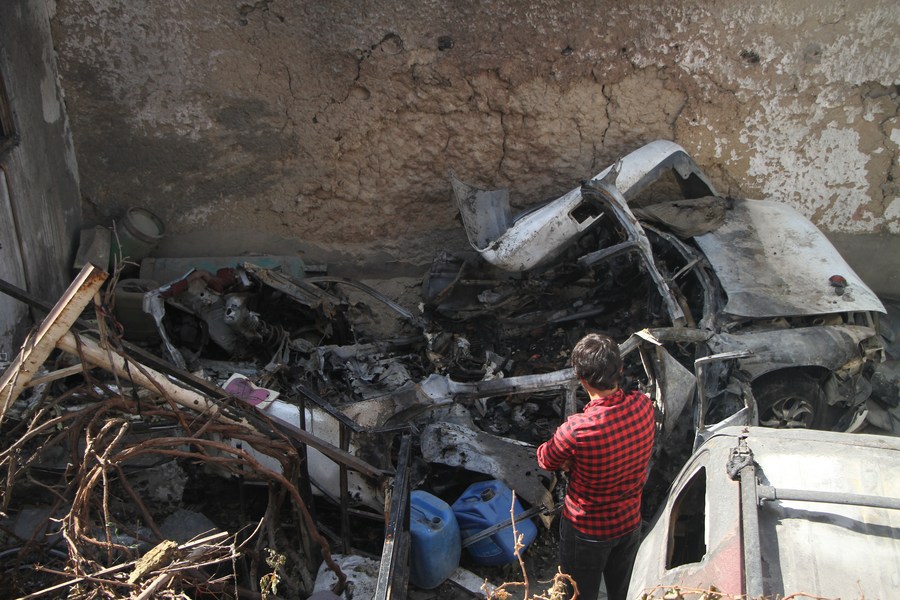
Photo taken on Sept. 2, 2021 shows damaged vehicles at the site of the U.S. airstrike in Kabul, Afghanistan. (Photo by Saifurahman Safi/Xinhua)
The United States has, as always, played innocent and blamed the former Afghan government for causing the misery.
Following the hasty pull out, the U.S. government quickly froze nearly 9.5 billion U.S. dollars in national foreign exchange assets held in the United States by the Afghan central bank, further aggravating the already dire humanitarian crisis in Afghanistan.
The United Nations World Food Programme warned earlier that Afghanistan is facing "an avalanche of hunger and destitution," with 98 percent of the population lacking adequate food.
SHIFTING ECONOMIC PRESSURE
Shifting domestic economic pressure onto other countries is another typical practice of the U.S. buck-passers.
In the 1980s, while the U.S. economy was mired in stagnation, Japan was enjoying an economic boom, prompting an increasing trade surplus with the United States. The U.S. government initiated 20 times of "Section 301 investigations" into Japanese products from 1976 to 1989, most of which ended with Japan's voluntary export restrictions.
In recent years, the United States has once again been caught in sluggish economic growth, weak manufacturing, stagnant middle class incomes and a widening gap between the rich and the poor. Instead of solving its own structural problems, Washington resorted to its old tricks of blaming others, slapping trade sanctions on other countries, disrupting the global economic order and dragging down the world economy.
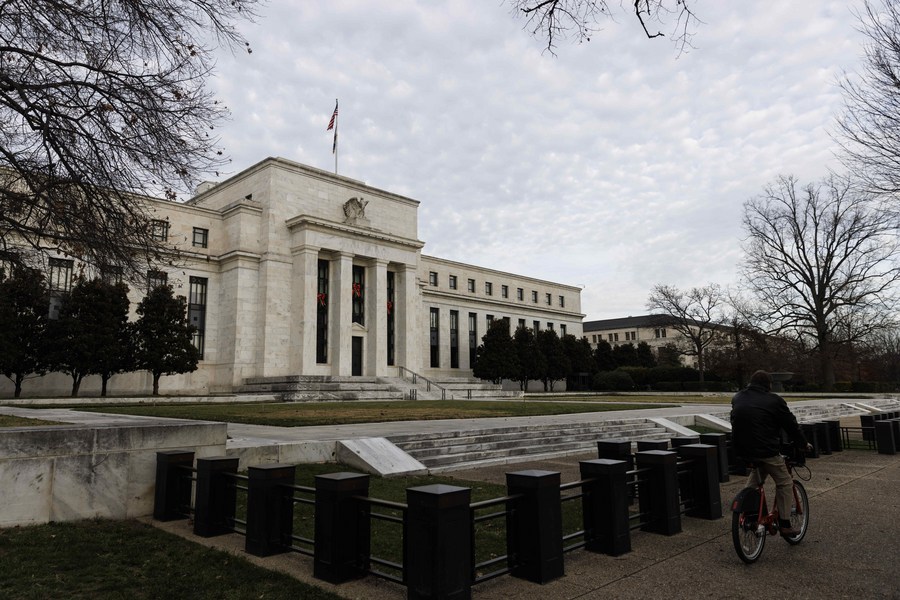
Photo taken on Dec. 15, 2021 shows the U.S. Federal Reserve in Washington, D.C., the United States. (Photo by Ting Shen/Xinhua)
"The U.S. trade deficit is the result of a deeper problem of America's own making," Stephen Roach, senior fellow at Yale University's Jackson Institute of Global Affairs, said in an article on the website of Project Syndicate.
Moreover, the United States has been exploiting the hegemony of the U.S. dollar to wring gains from the creation and flow of the global wealth.
Since the outbreak of COVID-19, in order to stimulate the U.S. economy, the Federal Reserve has once again turned to the "super easing" mode featuring zero interest rate and unlimited quantitative easing.
The U.S. classic practice of printing excessive money to make other countries "pay" for its deficits risks damaging other economies, especially the developing ones.
IRRESPONSIBLE SUPERPOWER
As the world's sole superpower, the United States has shirked its due responsibility to take a leading role in tackling global challenges.
Amid the still raging pandemic, the United States has been pursuing "vaccine nationalism" by hoarding excessively more doses of vaccines than it needs. It has also imposed export controls over raw materials needed for other countries to produce COVID-19 vaccines.
Also all too adept at dodging its responsibility for combating climate change is the United states, the world's largest cumulative emitter of greenhouse gases, which emits 3.3 times more carbon per capita than the global average registered in 2017.
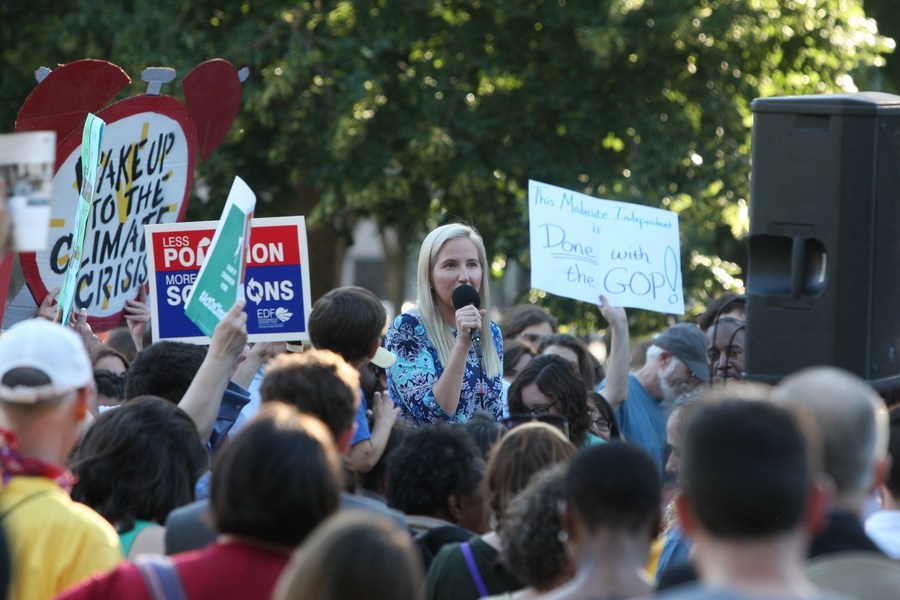
A demonstration is held to protest against U.S. President Donald Trump's decision to withdraw from the Paris Agreement outside the White House in Washington D.C., the United States, June 1, 2017. (Xinhua/Yan Liang)
However, the country is unwilling to be bound by international treaties regarding climate change, as it refuses to ratify the Kyoto Protocol and once withdrew from the Paris Agreement, while accusing developing countries of not doing enough to cut emissions.
SCAPEGOATING OTHERS
Against the backdrop of a still rampant global pandemic, some U.S. politicians have kept scapegoating others in a bid to cover up its own debacle in fighting the pandemic.
The United States has been concocting lies and spreading rumors against China, and politicizing origins tracing, which undermines global anti-pandemic cooperation.
Also, under the cover of fighting the pandemic, the country has been irresponsibly deporting immigrants, many infected with the virus, to other countries, further spreading the pandemic far beyond its borders.
Throughout the U.S. history, blaming foreigners for epidemics has never been a rarity. People of Chinese descent were the scapegoats when the smallpox epidemic broke out; and Haitian immigrants in the country were labeled as "high-risk groups" for AIDS; and some politicians called for banning West African immigrants from entering the country no matter whether their countries had reported Ebola cases or not.
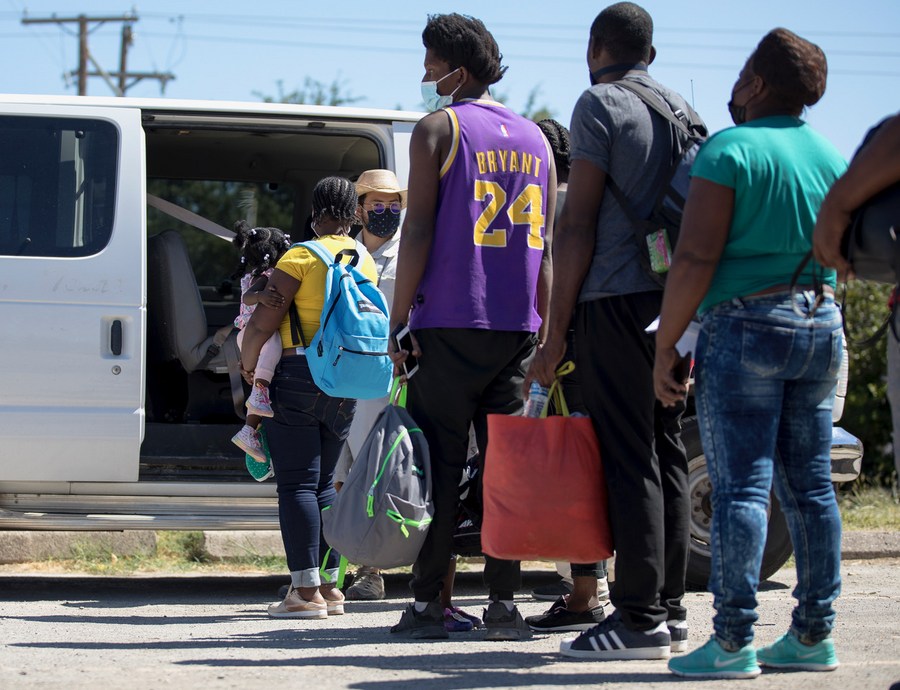
Haitian migrants who are seeking asylum wait to get into a van to be transported from Del Rio, Texas, the United States, Sept. 24, 2021. (Photo by Nick Wagner/Xinhua)
Americans have always linked pandemics to those they deemed outsiders, Jonathan Zimmerman, a professor at the University of Pennsylvania, said in an article published in The Washington Post.
"They provide a convenient scapegoat, absolving the rest of us from responsibility for the disease and death in our midst," he said. (Video reporters: Zhang Mocheng, Hu Yousong; video editors: Hong Liang, Mu Xuyao)■
